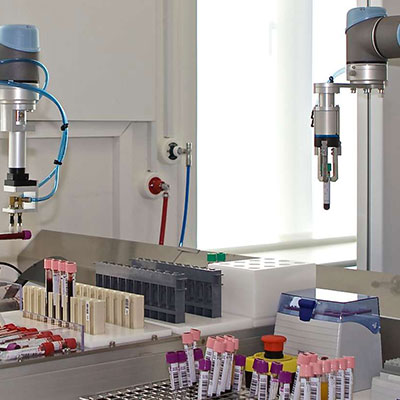The
chemical industry has achieved exponential growth in recent years and undergone intensive modernization process to address the global market demands with faster, more precise, and more efficient production.
Chemical processes have strict requirements of preciseness and reliability. These two play an important part when choosing collaborative robots.
Universal Robots’ Solutions: Precision and Repeatability
As in pharmaceuticals, the chemical industry is characterized by demand for safety, precision, and high quality. Universal Robots’ cobots, developed to collaborate with humans, yields successful results in chemical industry in addition to a wide range of other industries.
It offers flexible production advantage not found in other types of automation. Universal Robots’ cobot stands out with its small footprint, zero cost for periodic maintenance, and power savings. Working safely side by side with the human operators, it provides flexibility in production.
Integrated operation with other automation systems is also possible. Furthermore, a cobot is characterized by precision and repeatability in production. It successfully performs pick-and-drop, quality control, packaging, assembly, and processing applications.
The advantage of integrating a collaborative solution is the ability to reduce cycle times by increasing commissioning speed (preventing costly downtime) and overall productivity.
Safe and Hygienic Work Environment from Cobots
Universal Robots technology presents three different models of collaborative robots, all with the TÜV SÜD Certificate endorsing an absolutely safe and hygienic operation.
The UR5 and UR10 cobots by Universal Robots offer a wide range of alternatives for all types of production environments and applications depending on their load-bearing capacity and reach.
Different Carrying Capacities
Universal Robots cobots with different load-bearing capacities can be selected according to the application to be automated. In chemical sector, the cobot models UR5 and UR10 are in common use, but sometimes businesses prefer the UR3 model as well.
The UR5 cobot is equipped with operational capabilities adequate to interact with both machines in terms of weight and reach. It moves pigment jars from the micro-dispenser into the mixer, sets the caps, places the color cards in a barcode reader and once the toning measurement is complete, activates it from the spectrometer.
Case Studies from Cobots
US dental crown manufacturer Glidewell Laboratories operating in a special branch of the chemical industry for medical applications.
Glidewell uses one UR10 cobot and 4 CNC milling machines. With the integration of the collaborative robot, a better streamlining has been possible for the dental crown manufacturing process, which in turn has led to a significant increase in productivity and reduction in production time.
In fact, production time decreased from 27 to 18 hours. Cobot also improved the performance of the Aurolab kitting application. This manufacturer of surgical kits for cataract treatment increased its production by 15 percent or to 2 million pieces per year.
 Kandan Özgür Gök
Country Manager
Universal Robots Turkey&MEA
Kandan Özgür Gök
Country Manager
Universal Robots Turkey&MEA

 Kandan Özgür Gök
Country Manager
Universal Robots Turkey&MEA
Kandan Özgür Gök
Country Manager
Universal Robots Turkey&MEA